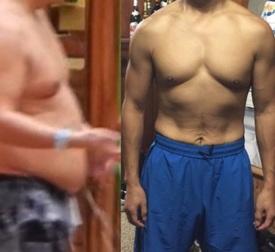Why do most diets fail?

bruhaha007
Posts: 333 Member
I have read and heard from so many people that a diet works, they lose the weight, only to put it back on and then some several months later. It seems like it is more the norm than the exception. What is the key to not putting it back on?
0
Replies
-
Lifestyle change instead of diet0
-
Winter.
For me.. it's winter. I do great Mid Feb/mar to nov. .. from late nov to feb/mar all I want to do is stay warm and eat carbs
There are so many reasons they "fail". Not realistic, life factors, people get tired of it... goes on and on..
0 -
One important one mentioned a LOT in the thread below is: you can't think of getting to your goal weight as the end of your journey.
http://community.myfitnesspal.com/en/discussion/1422943/long-time-maintainers-how-do-you-do-it/p1
You've gotta have a plan for the rest of your life.0 -
I'm not at maintenance yet, so take this as an opinion. I think that when you look at is as a diet, it is temporary, and that suggests an end date. Losing weight shouldn't be some torturous restrictive process. I think that if it is enjoyable and you learn better habits along the way, with the end goal to be maintaining what you have learned, then the chance of success is increased. The end goal isn't reaching the scale weight, it's keeping it.0
-
TavistockToad wrote: »Lifestyle change instead of diet
/thread0 -
Because people talk a good talk about "lifestyle change" but generally fail to implement such a change...they lose weight and then go back to "normal"...there has to be a new normal. I don't log and have been maintaining for going on three years now...when I was losing I adopted a healthy way of eating that I enjoy and exercised regularly...I have taken those things from losing into maintenance. Most people don't do that.0
-
complacency. drop a few...feel good...get complacent.0
-
For me it was not being on a diet, but a lifestyle change... I wanted to be able to lose weight eating all the foods I still loved, so that once I hit maintenance I wouldn't have to change anything except for eating more of the same things. I now eat the same foods and the same macro proportions as I did when I was losing weight, the only difference was 500 cal per day less of everything. Then once I hit my goal weight, I slowly increased to my maintenance calories. So my transition has been pretty smooth.
.0 -
Diets don't work it's about a lifestyle change. You have to want to lose weight you have to do it for yourself not anyone else. You need to be committed you have to exercise. Eat healthy not junk food or empty calories .0
-
xmichaelyx wrote: »TavistockToad wrote: »Lifestyle change instead of diet
/thread
Third0 -
Diets tell you (in general) what to eat to lose weight. Once you hit your goal, you go back to eating like you were before the diet, which is what made you gain the weight in the first place. A diet doesn't give you the tools you need to adjust your eating habits to sustain the weight loss. That's why I at least refer to it as 'changing your eating habits'. If you're just going to go back to eating the same way you were that put the weight on, what's the point? You have to learn the tools to use to keep the weight off, which diets don't do.0
-
Difference between being on a diet and changing your diet0
-
I looked up the word diet. And of course it is both a noun and a verb. And my diet is a noun. It is not something I do or requires action.. it is just types of food that I habitually eat on a day to day basis.
Diet to most others is a verb and while most others may feel that diet is known as dieting to restrict oneself as noted in the definition. Perhaps the mindset of a an individual person needs to not look at diet as this taboo word that means restrictive, hard, etc..,
It has to be first and foremost not to just loose weight, it has to be life changing and life altering way to a new lifestyle. If one just looses weight for the sake of loosing weight and did not learn new habits along the way nor a new mindset then the weight will certainly come back on. This is way easier for some than others. Some may yo-yo many times before it clicks.
Look at it this way, long term perspective is needed. You can tell how important something is today by measuring its potential future impact on your life.0 -
I lose the weight in time for the summer season, then gain it back over winter. I don't consider this failing.0
-
I think we all agree that it requires a sustained life style change and that one can't simply fall back into their old habits just because of a life event or circumstance that comes up. What about the set point theory that we all have a weight our bodies desire to be and the moment we slip our bodies go back to where it originally was? Maybe it takes years to create that new set point.
Great points on this thread, it is a struggle for so many people i thought it would be interesting and these comments reflect that.0 -
Losing weight is freaking hard, man. It's hard to change your habits for good.0
-
I've failed to maintain my weight loss in the past because the "lifestyle" changes I was making were too drastic and required me to exclude a huge list of foods. It was a big deal to eat out at a restaurant or at someone's house. What I ate was so clearly different from everyone else that it became an uncomfortable topic of conversation in social gatherings. My "lifestyle" became more and more all consuming, fueled more by emotion and less by critical thought, further alienating me socially. It was almost as if I was brainwashed into a food-based religious cult!! Eventually I decided I wanted a normal life back and started eating all the so-called "evil" foods again, and of course gained weight (but my overall health improved a lot). As I've started back down the weight loss path, I reflected on times in my life when I was able to maintain a low weight, and also *critically* read scientific weight loss studies (without the bias of my previous diet-lifestyle-religion) where participants lost weight and kept it off long term.
The one answer I found, consistent in my own life and in scientific research is it doesn't matter what you eat, if you create a calorie surplus you will gain weight. If you want to lose weight, you need to create a deficit. If you want to maintain weight, you need to avoid a calorie surplus.
It doesn't matter what you eat. You can eat junk food all day long as long you want. You don't have to eat non-fat, low fat, heart healthy, sugar free, lean protein, low carb, keto, vegan, vegetarian, whole grain, clean, organic anything at all. Sure eating less of certain foods makes it more likely to stay under your calorie targets and from a nutrition standpoint, if you're cutting calories, you need to make sure you're getting enough basic nutrition. But research shows *what* you eat has little to do with actual weight loss, it's *how much* you eat that matters.
You need to create a calorie deficit to lose weight. If you're gaining weight, it's because you don't have a calorie deficit.
That said, I'm not a health professional but I'm aware there are some medical conditions such that you could gain weight even with a calorie deficit... however for the majority of people, if you're gaining weight it's because you're eating too much.
The approach I'm taking for my weight loss is to set my target daily calorie intake to what is required to maintain my target weight. That way when I hit my target weight, I'll already be aware of how much food I should eat. I will always count calories for the rest of my life and I will always weigh myself at least weekly. I agree with the others, weight maintenance has to be a lifestyle change, but it shouldn't be such a drastic change that you can't sustain it for the rest of your life.
0 -
Great post @mmmpork How long have you been able to maintain at your target thus far with your new approach?0
-
Food taste good and the more calories the better the taste

Test how long you can hold your breath.0 -
Sometimes, though, you can lose the weight, feel fabulous and something comes out of nowhere and knocks you down, and the bad habits come sneaking back. For me, it was a serious injury compounded by the fact that the injury came while helping care for my dying brother. His death rocked me on so many levels, and then suddenly I could barely walk. I'd been happily sitting at 130 pounds for almost a decade, and then suddenly I was depressed, sad and basically crippled. I was comfort eating to cope with both the emotional and the physical pain, and for the first time in my life I couldn't just 'get up and walk it off'.0
-
Winter.
For me.. it's winter. I do great Mid Feb/mar to nov. .. from late nov to feb/mar all I want to do is stay warm and eat carbs
There are so many reasons they "fail". Not realistic, life factors, people get tired of it... goes on and on..
Lol, I first read that as "all I want to do is stay warm and eat crabs." I thought, well, that sounds pretty strange, but she must really like crabs ... 0
0 -
A whole dungeness crab is around 140 calories, so that sounds pretty good! I would say the hardest part is that you have to lose weight in your head before your body understands what you are doing. So you change your mind, you can change your body. But really its not as simple as that. Weight loss is always accompanied by other inner changes because excess weight accumulation is only the end product of in-congruent food attitudes, eating patterns and digestive processes. Lit's not the removal of weight so much as changing these processes that is your goal.0
-
Has to be a life habit that doesn't feel as though giving up everything you enjoy. Don't give up things, find acceptable alternatives or adjust the portion size. Have seen other posts about not "wasting" calories on rubbish foods but saving them for nice things.
Its been over a year now for me in maintenance, I eat more but only because I exercise harder, the key is finding an acceptable balance. I don't sweat a few lbs, my final target was 133 and now as long as I'm between 3 lbs (+/-) I'm happy. I do try and aim for minus pre holidays!
My favourite analogy is if you do "fall off" its like dropping your mobile phone, you don't then think well that's that then and stamp on it, you pick it up and move on.0 -
For me, maintaining a weight that is not overweight requires constant attention and a constant state of mild to moderate+ deprivation. Sometimes I just cannot or do not want to deal with it. I want to be a healthy weight, but the amount of effort required is ridiculous and overwhelming at times.0
-
Good question. Yes, most people do put the weight back on. Why? Because the switch has not gone on in their head that tells them this is a change for the rest of your life. This can be a daunting thought. Devise your own "diet" to meet your own needs and lifestyle. It takes a lot of reading and trial and error, and eventually, you find it. Don't be daunted and don't be taken in by fad diets. Life without excess weight and better fitness worth it. Nothing that is easy to get is worth having in life.0
-
Diet Fatigue...0
-
Why was I, 16 years ago, in the high 300s? There were simple answers. There was the daily visit to a C-store to buy a large bag of Doritos which I ate on the commute home. There was the daily visit to a C-store to buy a pint of chocolate milk and a bag of powdered doughnuts which I ate on the commute to work. There was the 'every time I saw a Jack-N-The-Box' stop for an Ultimate Cheeseburger. There was the pancakes, hash browns, and sausage breakfast at the company cafeteria after I got to work. There was the casual dining restaurant dinner with my wife after I got home. Every day. How did I get my weight down to the high 200s? Stop all that. After spending several years in the high 200's, I identified some new bad habits I'd gotten into which were keeping me in the high 200's. I've now changed my high-calorie, protein, and salt breakfast for a mostly protein and fiber breakfast. I've slightly adjusted my habits with the company junk food and candy bowl. I've moved a substantial portion of my calorie and salt budget from noon to evening. This allows me to have a generous meal when I get home. With these new changes, I can get a 1200-1500 calorie day with under 1500 mg Sodium and not experience any hunger. The only way this fails is if I get into more bad habits.0
-
you have to be able to carry on with the behaviors that allowed you to lose the weight in the first place. so if you limit yourself with a traditional diet, and make some foods off limits, you will gain weight once you start eating those foods again. limiting calories is not the same as limiting foods. when you limit calories, you basically give yourself permission to eat the foods you like in smaller quantities. And if you are losing weight slowly, it gives your body time to get used portion control, and develop a healthier attitude about food. Creating a plan of how to keep the weight off, once it is lost, is how you implement a lifestyle change.0
-
So much great insight and people speaking from their trials and experiences. I personally think it comes down to a lot of discipline and some people's genetics or medical factors make it even harder. We are addicted to sugar and food that tastes so good but no matter how much we eat those types of food don't satisfy so we are conditioned to eat more and more. So many variables at play but it is encouraging to see so many people desiring improved wellness and health and trying to break the cycle.0
-
bruhaha007 wrote: »So much great insight and people speaking from their trials and experiences. I personally think it comes down to a lot of discipline and some people's genetics or medical factors make it even harder. We are addicted to sugar and food that tastes so good but no matter how much we eat those types of food don't satisfy so we are conditioned to eat more and more. So many variables at play but it is encouraging to see so many people desiring improved wellness and health and trying to break the cycle.
Totally agree with you. Add to this, that in my generation anyway (I'm 52), in childhood, food was used as reward and punishment: Corporal punishment in school for not eating your all your school lunch. If you are badly behaved, go to bed without any supper. If you are good, here's some sweets or cake. Food and our upbringing link food and emotions later in life. That is perhaps why some people eat sweet things when they feel down, and the cycle begins and obesity is the result.0
This discussion has been closed.
Categories
- All Categories
- 1.4M Health, Wellness and Goals
- 398.1K Introduce Yourself
- 44.7K Getting Started
- 261K Health and Weight Loss
- 176.4K Food and Nutrition
- 47.7K Recipes
- 233K Fitness and Exercise
- 462 Sleep, Mindfulness and Overall Wellness
- 6.5K Goal: Maintaining Weight
- 8.7K Goal: Gaining Weight and Body Building
- 153.5K Motivation and Support
- 8.4K Challenges
- 1.4K Debate Club
- 96.5K Chit-Chat
- 2.6K Fun and Games
- 4.8K MyFitnessPal Information
- 12 News and Announcements
- 21 MyFitnessPal Academy
- 1.5K Feature Suggestions and Ideas
- 3.2K MyFitnessPal Tech Support Questions






















